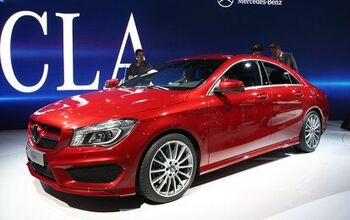Generation Why: BMW And Mercedes Ignore Coach At Their Peril
BMW’s debut of the American-spec 320i at this year’s NAIAS may have been big news for the American auto press, but up here in frigid Canuckistan, the 320i is old hat. Roughly a decade ago, BMW launched the $33,900 320i, along with an ad campaign touting its price, which was comparable to a well equipped Honda Accord.
Very few Accord customers were poached by BMW; those looking for an Accord wanted the extra space, the power from a comparably-priced Accord V6 and found a BMW a little too obnoxious. Car enthusiasts may have been attracted to the rear-drive dynamics and the silky inline-six engine, but the 170 horsepower figure was considered lacking, and what better way to out oneself as a try-hard striver than to buy the cheapo, leatherette-equipped base 3-Series?
BMW ended up doing fairly brisk business with the 320i, with much of their client base consisting of young, professional women (whether in the workforce or collecting an annuity from the First Bank of Mom and Dad) who also would have carried a Coach handbag. I say “would have”, because at the time, Coach was the bridge between a nasty department store house brand and the absurdly expensive Louis Vuitton, Balenciaga or Hermes bags. Remember, this was a decade ago and we were a few orders of magnitude removed from today. The cheap-credit-and-Kardashian-fueled mental illness that compelled the masses to find one percent aspirational goods essential to one’s well-being was barely in a gestational stage. The idea of spending four figures on a handbag when one worked at an entry-level white collar job would have been seen as irresponsible and reckless at worst, crass at best.
Fast forward a decade; a confluence of societal forces, from fashion magazines to reality TV to rap music, has convinced us that luxury goods are the key to fulfillment and happiness in life. I don’t mean traditional luxury goods, like a mechanical watch, or a well-made pair of shoes or bespoke clothing that requires a significant upfront investment in return for a lifespan of a few decades (or, in the case of a good watch, one that may outlive you by a couple generations). I mean luxury as in lug-zhur-ee, proletarian crap made somewhere offshore and sold for an absurd markup (most clothing items sold in Neiman Marcus, Saks or Bloomingdales), or worse, objects that serve as tokens of social status that masquerade as ethically or morally superior consumption choices despite evidence that asserts the dubious nature of these claims (any food or clothing item that is “local”, “organic”, “sustainable”, “artisanal” or any combination of these buzzwords).
Left without any sort of moral, spiritual, familial or economically stability in the first quarter of life, Generation Why has become the most aspirational generation of all-time, and the onslaught of smart phones and social media has enabled this disease like a co-dependent parent plying their drug addict child with money for meth and cigarettes. I myself am guilty of this, taking a perverse pleasure in posting photos of press cars on Facebook so that former highschool classmates I haven’t spoken to in years can press “Like” on my photos. But Mercedes-Benz and BMW are far better at making money off this phenomenon.
At NAIAS, the two brands released two cars aimed dead-on at Generation Why members with a bit of money or reasonable access to credit: the newest generation 320i is a novel and exciting foray for BMW USA, but Mercedes-Benz’s CLA is an entirely new frontier for German luxury cars, one that BMW won’t catch up to for a couple more years.
At this point, obnoxious Audi die-hards will note that the A3 and A4 have long been entry-level, front drive options like the CLA, but I’m inclined to dismiss these assertions. The A4’s front-drive layout was a consequence of circumstances, while the current generation A3, fine car as it may be, is a half-hearted Euro-transplant ill-suited for the American market (but great for Canada). The CLA, on the other hand, is expressly designed to be a cut-rate, entry-level Benz, devoid of substance, awkwardly styled and priced just far enough out of reach for a no-credit Cruze customer, but just accessibly enough that a pharmaceutical sales rep or social media brand strategist could afford the $299 a month lease payment.
There is one and only one reason behind the move; volume. The unquenchable quest for volume has led to a sales war between Mercedes-Benz and BMW, with both companies also trying to stave off a full-frontal assault by Audi. All three companies can use their premium positions and scale to capitalize on both margins and volume (Audi may be best suited for this, due to its scale and modular platforms, but that’s another article in itself). And while Europe may be in the toilet, the appetite for premium cars is still strong – hell, why buy a Focus when you can buy a front-drive BMW 1-Series or Mercedes B-Class that costs just as much? Needless to say, the hunger in America has only grown, even as the economy has nosedived. Even if you and everyone else is worse off compared to 2008, god forbid you should display any outward signs of frugality (which is of course, weakness and a loss of social status).
Sounds foolproof, right? After all, Mercedes, BMW and Audi have such strong brands that it will be almost impossible to erode their equity as premium marques, and they can continue to pump out front drive compacts until the Eurozone implodes. If you’re a management track sycophant at one of those companies, then that’s what you’ll tell the board.
Everyone else should take note of what happened to Coach. Their bags, once desirable luxury goods, are now the sort of thing that overprivileged mothers joke about giving to their Filipino nannies as Christmas gifts. Except it’s not a joke – ride the bus near the wealthy neighborhoods of Toronto, and you’ll see Coach bags being carried by the help, even though they live in low-rent walkups. The rich moms and daughters have moved on to Longchamp bags for every day, and the previously unthinkable Hermes, Louis V, Balenciaga and all manner of obscure boutique labels that nobody has ever heard of and will forget about in six months (what the fuck is a Proenza Schouler bag? I don’t know, but that didn’t stop one girl from telling me how much she paid – as much as a solid NB Miata – and how long she waited for it on a waiting list).
Lest you think this has no relevance to the auto market, think back to when just having a Mercedes was a big deal, how extravagant and expensive it was to have a vinyl-upholstered 240D that took a glacial age to hit 60 mph. But it was imported and foreign and therefore prestigious. Now any of our new age celebrity demigods – think the Kardashians, or Lil Wayne or Dwight Howard – wouldn’t be caught dead in anything less than an S-Class. A Bentley, a G-Wagen or a 458 Italia are really the minimum requirement, and even the Bugatti Veyron, the finest car in the world from a technological standpoint, is the province of D-list rap stars and domestic abusers. The only reason that the top-tier of luxury and performance vehicles is considered the minimum entrypoint for “baller status” is directly related to the erosion of Mercedes and BMW as a brand completely out of reach for the masses. Now that any 9-5 working stiff has “an entrypoint into the brand”, they’re not nearly as special as they once were. They are fast becoming the Coach bags of the luxury car world, and all the pretty rich boys and girls have moved on to the really exclusive stuff, the Bugattis, Bentleys and Birkin bags.
The CLA and the 320i may fool the terminally insecure, regardless of age or gender, but Generation Why, the one that doesn’t care about cars, probably won’t be fooled. If there’s one thing we are good at, it’s detecting disingenuous appeals to our own vanity and self-importance. Personally, I’m hoping for a return to a new kind of luxury, one that is discreet, efficient and pampering to those who are in the know or behind the wheel. The 2013 Accord V6 Touring looks like it would fit the bill quite nicely. And what do you know, it’s only as much as a poorly-equipped 3-Series.
More by Derek Kreindler
Latest Car Reviews
Read moreLatest Product Reviews
Read moreRecent Comments
- Justin You guys still looking for that sportbak? I just saw one on the Facebook marketplace in Arizona
- 28-Cars-Later I cannot remember what happens now, but there are whiteblocks in this period which develop a "tick" like sound which indicates they are toast (maybe head gasket?). Ten or so years ago I looked at an '03 or '04 S60 (I forget why) and I brought my Volvo indy along to tell me if it was worth my time - it ticked and that's when I learned this. This XC90 is probably worth about $300 as it sits, not kidding, and it will cost you conservatively $2500 for an engine swap (all the ones I see on car-part.com have north of 130K miles starting at $1,100 and that's not including freight to a shop, shop labor, other internals to do such as timing belt while engine out etc).
- 28-Cars-Later Ford reported it lost $132,000 for each of its 10,000 electric vehicles sold in the first quarter of 2024, according to CNN. The sales were down 20 percent from the first quarter of 2023 and would “drag down earnings for the company overall.”The losses include “hundreds of millions being spent on research and development of the next generation of EVs for Ford. Those investments are years away from paying off.” [if they ever are recouped] Ford is the only major carmaker breaking out EV numbers by themselves. But other marques likely suffer similar losses. https://www.zerohedge.com/political/fords-120000-loss-vehicle-shows-california-ev-goals-are-impossible Given these facts, how did Tesla ever produce anything in volume let alone profit?
- AZFelix Let's forego all of this dilly-dallying with autonomous cars and cut right to the chase and the only real solution.
- Zelgadis Elantra NLine in Lava Orange. I will never buy a dirty dishwater car again. I need color in my life.


































Comments
Join the conversation
Well done, Derek!
After reading these comments I'm going to smash all my watches!!!